
 The grassroots organisations in our country serve different communities and are most effective in devising sustainable solutions to various on-ground issues. However, since the advent of COVID-19, these NGOs have faced numerous challenges in their functioning and growth. There is a need to bring in collaborative philanthropy and address their organisational development needs if we are to strengthen and support these NGOs across India. This is where the Grassroots, Resilience, Ownership and Wellness (GROW) Fund – a first-of-its-kind initiative aimed at building the capabilities, resilience and future readiness of grassroots organisations, sequentially facilitating their efforts to effect change at the grassroots. CSR Mandate speaks with Naghma Mulla, CEO of EdelGive Foundation, to understand this initiative better.
The grassroots organisations in our country serve different communities and are most effective in devising sustainable solutions to various on-ground issues. However, since the advent of COVID-19, these NGOs have faced numerous challenges in their functioning and growth. There is a need to bring in collaborative philanthropy and address their organisational development needs if we are to strengthen and support these NGOs across India. This is where the Grassroots, Resilience, Ownership and Wellness (GROW) Fund – a first-of-its-kind initiative aimed at building the capabilities, resilience and future readiness of grassroots organisations, sequentially facilitating their efforts to effect change at the grassroots. CSR Mandate speaks with Naghma Mulla, CEO of EdelGive Foundation, to understand this initiative better.
Could you share a brief background about the platform and its core objective?
The role of grassroots organisations is crucial in the Indian development ecosystem aiming to solve the impending social issues. The pandemic and its disastrous effects have cemented this further – with grassroots organisations innovating and quickly adapting to serve fine-grained problems and provide relief to the communities they work. They have faced numerous challenges in their growth and sustenance, including depleting funds and risks of forced closure.
The GROW Fund houses a unique collective of philanthropists, established by the EdelGive Foundation, to pool and deploy funding of INR 100 Crores to support and sustain 100 grassroots organisations for 24 months, enabling them to operate optimally, be sustainable and reach the last mile to enhance impact. The Fund does this by covering critical costs, building capacities, and investing in organisational development for future-readiness.
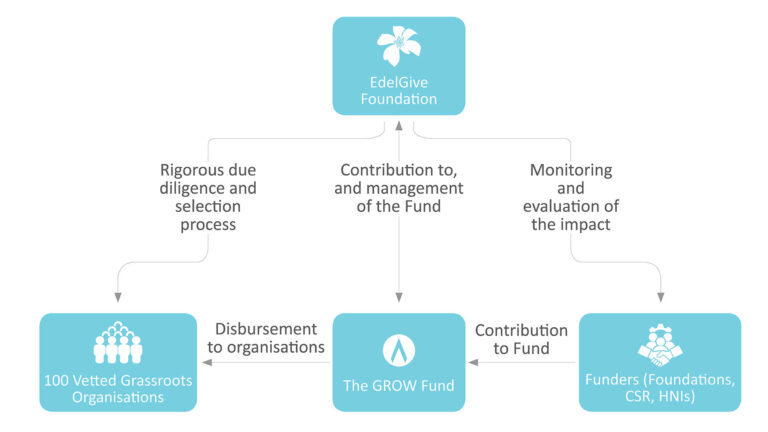 As a response, the Grassroots, Resilience, Ownership and Wellness (GROW) Fund, a first-of-its-kind initiative, was conceptualised to redefine philanthropy by committing to build a conducive ecosystem for organisations to be resilient and future-ready.
As a response, the Grassroots, Resilience, Ownership and Wellness (GROW) Fund, a first-of-its-kind initiative, was conceptualised to redefine philanthropy by committing to build a conducive ecosystem for organisations to be resilient and future-ready.
The GROW Fund houses a unique collective of philanthropists, established by the EdelGive Foundation, to pool and deploy funding of INR 100 Crores to support and sustain 100 grassroots organisations for 24 months, enabling them to operate optimally, be sustainable and reach the last mile to enhance impact. The Fund does this by covering critical costs, building capacities, and investing in organisational development for future-readiness.
Why is Collaborative Philanthropy important in India?
Often, multiple stakeholders, including funders, corporates and grassroots organisations working on interventions in specific areas like education, livelihoods or gender equality. However, most of these issues are interconnected. Hence, coordinated efforts are required to address all aspects. Without collaborative efforts, these organisations work in silos, reducing the synergistic impact that could potentially be achieved. For instance, health issues arising from inadequate sanitation and hygiene may impact the education of children in that community as they fall sick and fail to attend school.
 In this regard, collaborative philanthropy can help connect investors, NGOs and corporates to join hands and collaborate to address challenges faced by underserved communities holistically. Collaborative philanthropy can help mobilise larger funding, facilitate knowledge-sharing, and influence public policy and decisions. The sheer length, breadth and width of the problems we attempt to tackle, coupled with ambitious targets mean that no single actor/stakeholder can hope to achieve desired results, working individually or in silos. It is therefore vital for civil society, the development sector and corporates to embrace collaborations and collective action as the primary method for effecting the necessary change.
In this regard, collaborative philanthropy can help connect investors, NGOs and corporates to join hands and collaborate to address challenges faced by underserved communities holistically. Collaborative philanthropy can help mobilise larger funding, facilitate knowledge-sharing, and influence public policy and decisions. The sheer length, breadth and width of the problems we attempt to tackle, coupled with ambitious targets mean that no single actor/stakeholder can hope to achieve desired results, working individually or in silos. It is therefore vital for civil society, the development sector and corporates to embrace collaborations and collective action as the primary method for effecting the necessary change.
Through the collaborative efforts of these funders, the GROW Fund will invest up to INR 100 Crores over two years in the 100 selected NGOs to build their capabilities, resilience and future-readiness.
What was the grant amount provided by the organisation to the selected 100 NGOs?
The GROW Fund has several Indian and international funders – including philanthropic institutions and eminent philanthropists like Bill and Melinda Gates Foundation, Manan Trust, Rohini Nilekani Philanthropies, MacArthur Foundation, A.T.E. Chandra Foundation, Rainmatter Foundation, Dalyan Foundation, Oak Foundation – a private philanthropy partner, Indus Foundation of Utah, Omidyar Network India and Ashish Kacholia, along with the Edelweiss Group. Additionally, eminent business persons and changemakers such as Sanjay Purohit, Rati Forbes, the Bikhchandani family, Helenka & Sunil Anand, Onward Foundation and Govind Iyer have also lent their support to the Fund.
Through the collaborative efforts of these funders, the GROW Fund will invest up to INR 100 Crores over two years in the 100 selected NGOs to build their capabilities, resilience and future-readiness.
What are the sectors in priority for grant allocation, and why?
The 100 NGOs receiving grants from the GROW Fund were selected from 20 States across India. They work across ten key thematic areas:
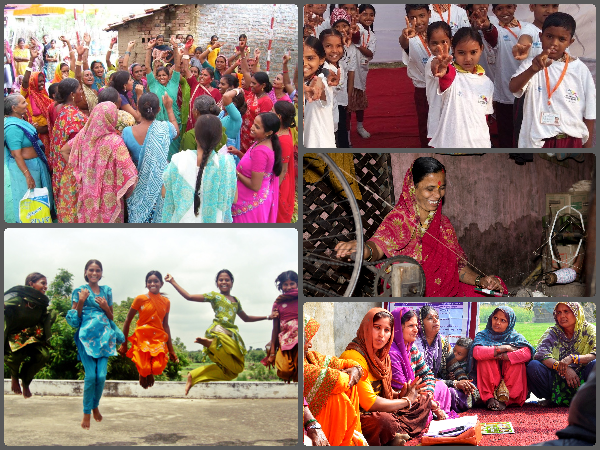 Art and Culture
Art and Culture - Education
- Community Welfare
- Differently Abled
- Livelihood
- Gender, Rights and Equality
- Climate, Ecology and Animal Welfare
- Research and Advocacy
- Health and Sanitation
- Poverty Alleviation
GROW’s final 100 were selected ensuring an equal split across all four zones and broader representation across a range of thematic areas mentioned above. The final 100 were identified keeping in mind their current agility around implementing inputs and building potential capacities. A range of thematic areas was chosen due to the intersectional nature of varied social issues in India. Moreover, different geographies require tailor-made solutions to be able to impact their respective communities. Therefore, our idea of impact banks upon the synergistic effect of treating varied issues across geographies for a holistic impact on a national scale.
What were the criteria for NGOs selection?
We conducted the overall evaluation through a process, including a completeness and compliance check, multi-stage scoring and rationalisation, review by an external expert panel, and final due diligence. We also conducted an initial check to ensure that applications met the preliminary eligibility criteria and contained basic finance and compliance-related documents. All eligible applications were scored using a set of pre-defined scoring criteria in two areas – organisational information and a detailed proposal. The scores were then rationalised, shortlisting 241 organisations for consideration by an expert panel.
We invited four panels comprising 16 experts and five internal panellists to review these applications. The panels identified 157 organisations that underwent a detailed due diligence process, including a thorough compliance check, background check, and public domain search. Based on these results, the final 100 were selected ensuring an equal split across all four zones and a broader representation across a range of thematic areas. While no force-fit was done to arrive at the final list, factors such as the ability to absorb foreign funds, scores from evaluations and expert panel recommendations were considered to identify the final 100 in alignment with the programme objectives.
Along with the grant, is there any additional support that GROW is providing to the shortlisted NGOs to be future-ready?
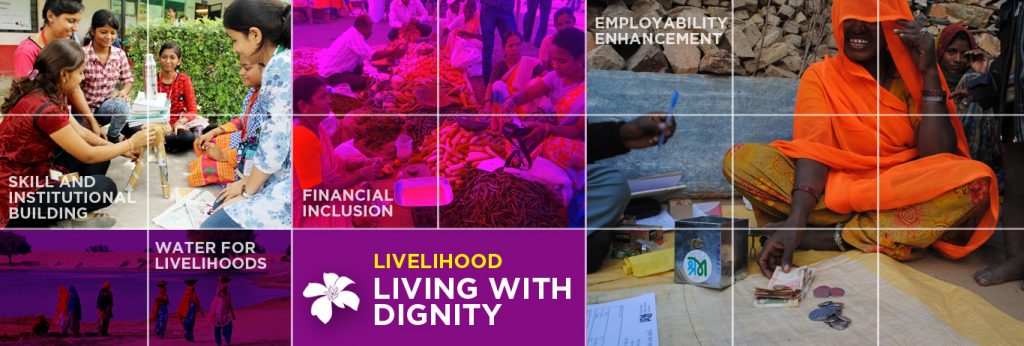 In addition to the core costs grant, the 100 NGOs selected under GROW will also receive support in capacity building and organisational development, managed by a central capacity-building helpdesk at
In addition to the core costs grant, the 100 NGOs selected under GROW will also receive support in capacity building and organisational development, managed by a central capacity-building helpdesk at 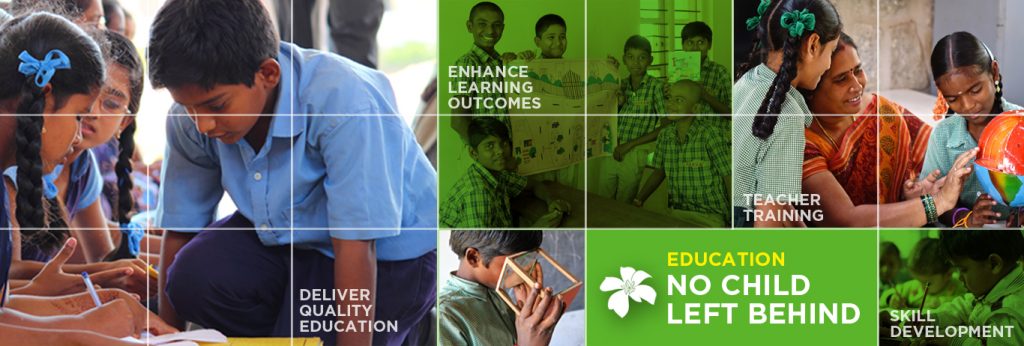 EdelGive. We have identified Technology, Human Resources, Finance & Compliance, and Website Audit & Development as primary domains in which the Capacity Building helpdesk would offer support.
EdelGive. We have identified Technology, Human Resources, Finance & Compliance, and Website Audit & Development as primary domains in which the Capacity Building helpdesk would offer support.
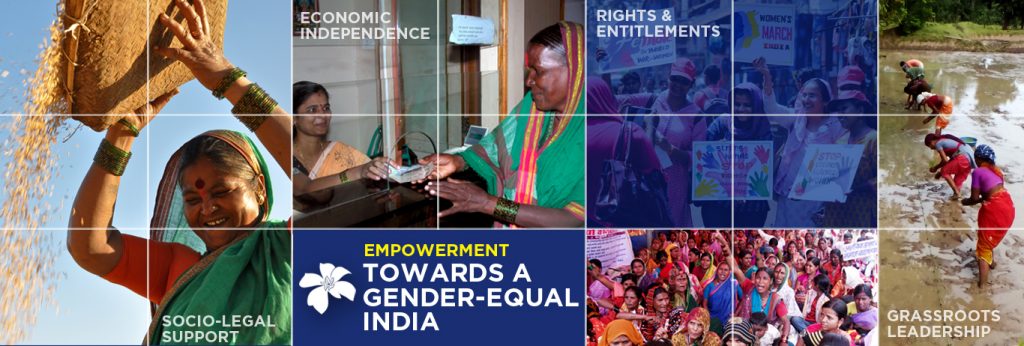 An impact assessment framework for all GROW organisations, including baseline, midline and endline assessments was planned to measure the initiative’s contribution. The final baseline questionnaire, which includes a detailed assessment of an organisation’s strengths and gap areas across 12 domains, is generated through a detailed organisational diagnostics report.
An impact assessment framework for all GROW organisations, including baseline, midline and endline assessments was planned to measure the initiative’s contribution. The final baseline questionnaire, which includes a detailed assessment of an organisation’s strengths and gap areas across 12 domains, is generated through a detailed organisational diagnostics report.
Collaborations have always been an efficient method of working in the development ecosystem. The government, citizens, companies and civil society cannot function separately. Moreover, the recent pandemic-induced restrictions have centrestaged how collaborations are effective in tackling issues and providing relief to communities. Collaborations can no longer be considered an option but are imperative for the sector’s future.
How can community well-being and development be attained through collaborative philanthropy?
The adoption of novel solutions needs to happen at the ground level otherwise, the success would only scale for the short term. It would fade away when the project cycle comes towards its completion. Grassroots organisations are the real changemakers that work on the ground to tackle different issues faced by several underserved communities. To enable them, it is necessary to help them deepen their capacities to absorb technology, financial models and systemic solutions. This would lend more perspective to organisations poised for scale and a larger impact.
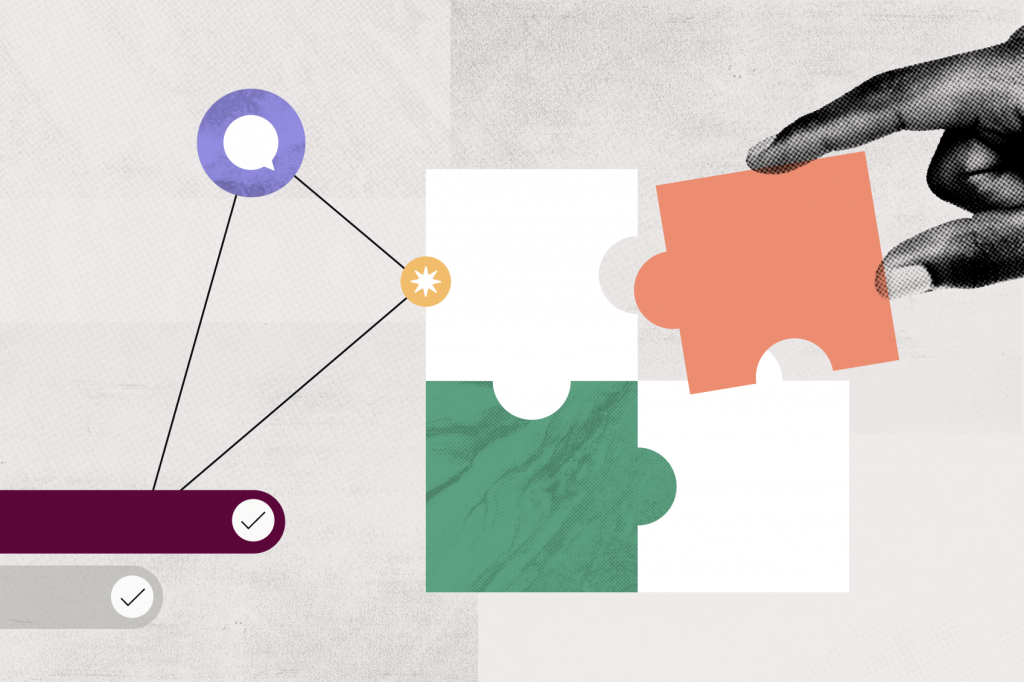 Collaborative philanthropy would facilitate cross-learning, coordinated investment of resources and utilisation of collective strengths to drive large-scale impact in the target communities. Collaborations have always been an efficient method of working in the development ecosystem. The government, citizens, companies and civil society cannot function separately. Moreover, the recent pandemic-induced restrictions have centrestaged how collaborations are effective in tackling issues and providing relief to communities. Collaborations can no longer be considered an option but are imperative for the sector’s future.
Collaborative philanthropy would facilitate cross-learning, coordinated investment of resources and utilisation of collective strengths to drive large-scale impact in the target communities. Collaborations have always been an efficient method of working in the development ecosystem. The government, citizens, companies and civil society cannot function separately. Moreover, the recent pandemic-induced restrictions have centrestaged how collaborations are effective in tackling issues and providing relief to communities. Collaborations can no longer be considered an option but are imperative for the sector’s future.







